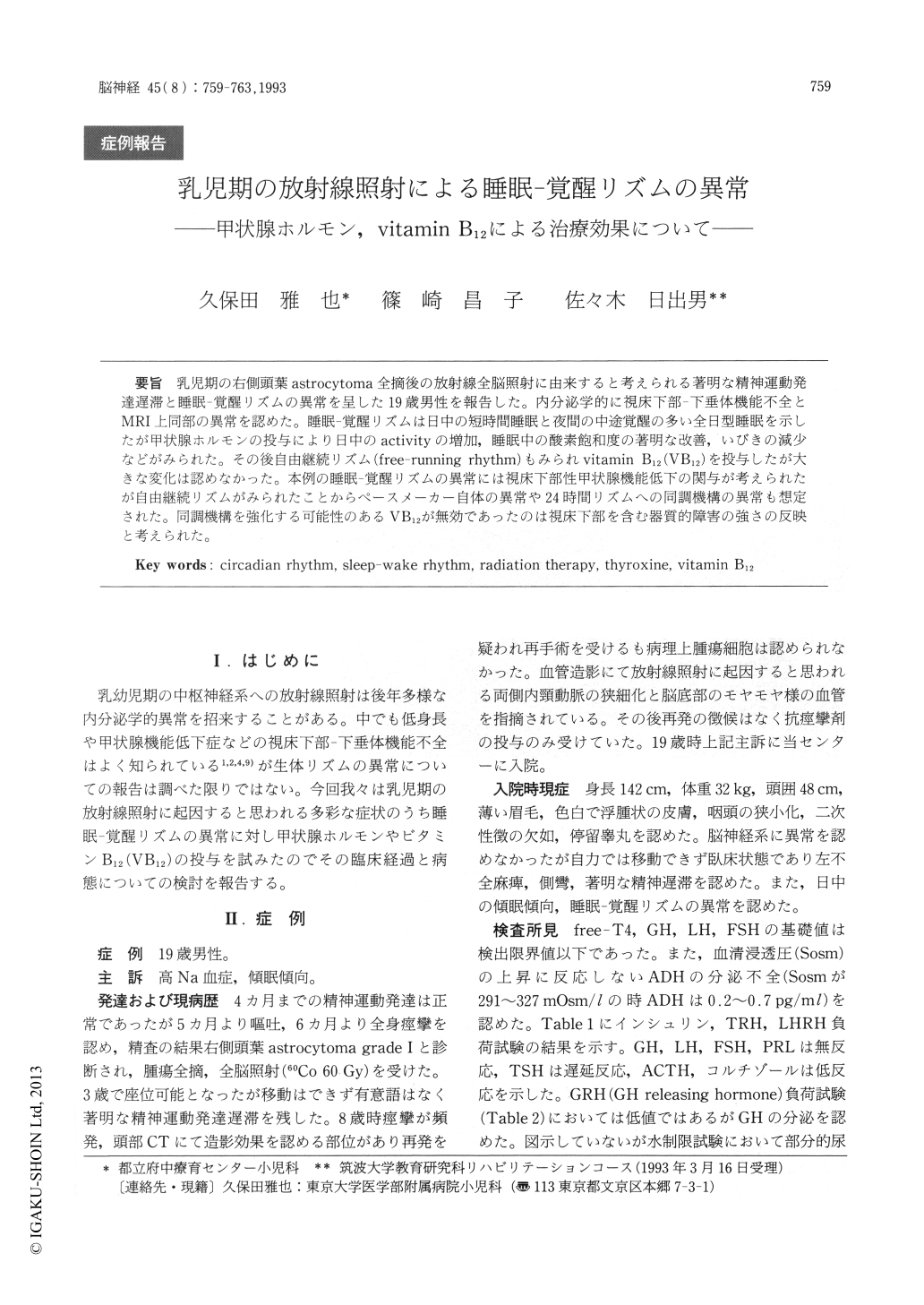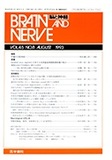Japanese
English
- 有料閲覧
- Abstract 文献概要
- 1ページ目 Look Inside
乳児期の右側頭葉astrocytoma全摘後の放射線全脳照射に由来すると考えられる著明な精神運動発達遅滞と睡眠—覚醒リズムの異常を呈した19歳男性を報告した。内分泌学的に視床下部—下垂体機能不全とMRI上同部の異常を認めた。睡眠—覚醒リズムは日中の短時間睡眠と夜間の中途覚醒の多い全日型睡眠を示したが甲状腺ホルモンの投与により日中のactivityの増加,睡眠中の酸素飽和度の著明な改善,いびきの減少などがみられた。その後自由継続リズム(free-running rhythm)もみられvitamin B12(VB12)を投与したが大きな変化は認めなかった。本例の睡眠—覚醒リズムの異常には視床下部性甲状腺機能低下の関与が考えられたが自由継続リズムがみられたことからペースメーカー自体の異常や24時間リズムへの同調機構の異常も想定された。同調機構を強化する可能性のあるVB12が無効であったのは視床下部を含む器質的障害の強さの反映と考えられた。
We reported here 19-year-old man suffering from circadian sleep-wake (S-W) rhythm disturbance after total tumor resection and whole brain irradiation.
This 19-year-old man was diagnosed as having astrocytoma in the right temporal lobe by CT scan and angiography at the age of 6 months. After total tumor resection and whole brain irradiation (60Co 60 Gy), he showed profound psychomotor retarda-tion, endoclinologic dysfunction including hypothy-roidism and growth hormone deficiency, and sleep-wake rhythm disturbance. At the age of 19, brain MRI revealed asymmetrical low intensity in the hypothalamic region. On endoclinological examina-tion panhypopituitalism due to primary hypotha-lamic lesion was evident. His S-W rhythm was disturbed showing a dipersed type sleep, i.e., sleep periods were dispersedly distributed throughout the 24 hours. So he showed a lethargic tendency in the daytime. All-day polysomnography revealed abnor-mal sleep structure such as the absence of sleep spindle and hump, peripheral apnea, snoring and low oxygen saturation.
After L-thyroxine supplementation his daily activity improved gradually. The decrease in short time sleep and tendency of a free-running rhythm were observed and oxygen saturation improved remarkably. Peripheral apnea and snoring disappeared. This wakening effect of L-thyroxine administration may be due to improvement of hypothyroidism symptom such as myxoedematous pharynx. In addition, it seems related to the altera-tion of the central S-W rhythm regulation, becausefree-running rhythm appeared after L-thyroxine administration.
Vitamin B12 (VB12), which has been reported to be effective for sleep-wake rhythm disorders, was not effective for our patient's free-running rhythm. Compared with the patients responded to V B12, our patient's organic brain damage was more evident radiologically and endoclinologically. Following the hypothesis that VB12 has a potential to reinforce the entrainment of circadian rhythm, our patient's organic brain damage may include entrainment system.

Copyright © 1993, Igaku-Shoin Ltd. All rights reserved.


